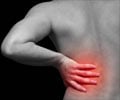Over half the population in New Delhi and in Mumbai suffers from backache, caused mainly by the poor public transport system, says a new study.
Over half the population in New Delhi and in Mumbai suffers from backache, caused mainly by the poor public transport system, says a new study.
Carried out by Health India, a New Delhi-based non-profit group, the study found that over 40 percent of people in New Delhi and 77 percent in Mumbai who use public transport as the sole mode of communication reported back problems."Bad roads, overcrowded public transport systems, poor quality of chairs, and rough rides compound the problem for youngsters of both metros," said Dev Mehra, director of Health India.
He said backaches were growing by over 15 percent among the younger generation. "Unruly and drunken driving among youngsters also add to the trouble." Mehra said. Said Arvind Jaiswal, professor at the department of orthopaedics, All India Institute of Medical Sciences (AIIMS): "Sudden jerks or movements during travel can result in severe back pain. Our spine includes a number of muscles that may get pressurised due to bad postures during travel."
Jaiswal said the experience of AIIMS was that an increasing number of young professionals were suffering from back problems, "with people from the IT and BPO sectors among the worst hit". He said poor transport, faulty posture and drunken driving were responsible for most backaches. Cigarettes and coffee also rate high in the list of substances that "cause bone calcium to deplete, thereby contributing to backaches".
But the study revealed that most people complaining of backaches don't work in front of the computer.
"Hence, there is a very positive correlation between people who have been commuting to their workplace using public transport and the rate of incidence. Commuting contributes to the problem in many ways. The type of vehicle used, the quality of the roads and the average time of travel - all have a multiplier effect on the back," said the study.
Advertisement
The three-month study found that a reduced intake of milk also led to spinal disorders. An increased intake of junk food and aerated beverages, lack of sufficient exercise and a constrained workspace weakens muscles of the spine and the stomach.
Advertisement
The researchers suggest that office goers could minimise back pain by taking short breaks and stretching periodically while at work. Least invasive treatments like physical therapy, stretching, ointment massage and acupuncture should be tried out before going in for surgery.
Source-IANS
SRM








